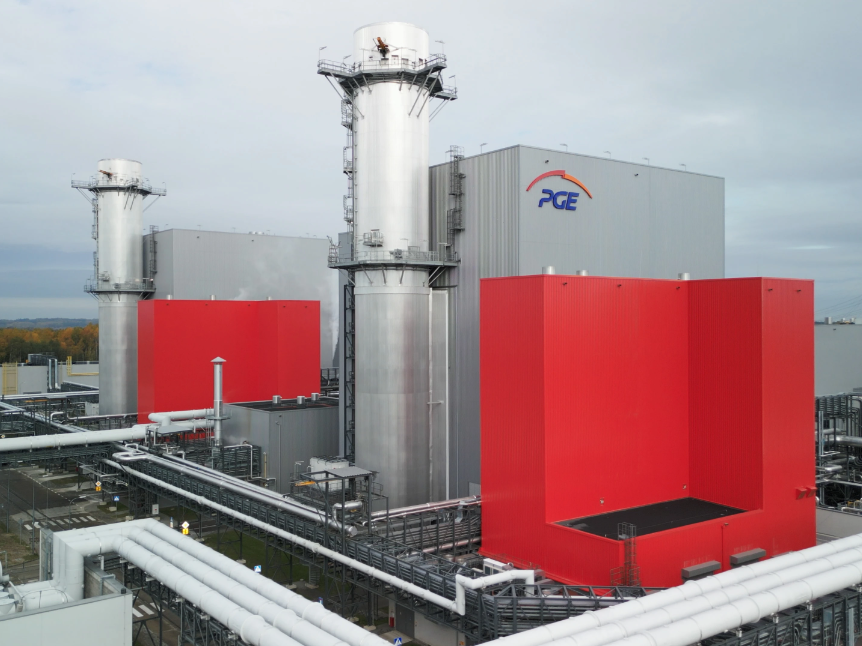Keep our news free from ads and paywalls by making a donation to support our work!

Notes from Poland is run by a small editorial team and is published by an independent, non-profit foundation that is funded through donations from our readers. We cannot do what we do without your support.
Poland’s largest gas-fired power station, which will supply enough electricity to meet 5% of national demand, has gone into operation. Its operator, state-owned PGE, which is Poland’s biggest power producer, claims that the plant is “one of the most modern in Europe”.
The investment “will strengthen Poland’s energy security and ensure a stable energy supply for more than 3 million households,” Dariusz Marzec, PGE’s CEO, declared at the launch ceremony.
Tak prezentuje się przekazana dziś do eksploatacji przez #PGE Polską Grupę Energetyczną największa elektrownia gazowa w Polsce i jedna z najnowocześniejszych w Europie o mocy 1366 MW. Inwestycja zlokalizowana jest w #Gryfino, w województwie zachodniopomorskim. Jednostka będzie… pic.twitter.com/deacXPg63h
— PGE Polska Grupa Energetyczna (@Grupa_PGE) October 29, 2024
The PGE Gryfino Dolna Odra power station, which cost over 3.7 billion zloty (€856 million) to develop, is located in the West Pomerania province in northwest Poland and consists of two gas-steam units, each with a gross capacity of 683 MW.
Its nominal efficiency exceeds 63%, which PGE says makes it over 70% more efficient than old coal-fired units. Poland still relies on coal to produce almost two thirds of its electricity, by far the highest proportion in Europe, but has in recent years been moving towards lower-emission sources.
The new plant “has been designed to meet the most stringent emission limits,” claims PGE, with emissions of dust and sulphur oxides reduced to almost zero.
Its emission rate is estimated at 330g carbon dioxide (CO2) per kWh of generated electricity, which is almost three times lower than in coal-fired units.
The launch of the power station was welcomed by deputy climate minister Miłosz Motyka, who said that it will “not only have a direct impact on the stability of the electricity system, i.e. on security, but is also another step in the transformation of our economy”.
“Gas investment is a very important part of the energy transition and the move towards climate neutrality,” added Robert Kropiwnicki, deputy minister of state assets.
“We are constantly expanding the RES [renewable energy] system,” said Kropiwnicki, but renewables “need parallel stable energy sources working as a base, and at the moment there is no more flexible capacity than gas capacity”.
Just this week, Poland was forced to import energy from neighbouring Germany, Sweden and Ukraine as a lack of wind led to a decline in energy production from wind turbines, reports Business Insider Polska.
Renewables generated a record 26% of Poland’s electricity in 2023, up from 19% the previous year.
However, coal continued to produce most of the country’s power, accounting for almost two thirds of the energy mix https://t.co/JQqfMkOK4I
— Notes from Poland 🇵🇱 (@notesfrompoland) January 3, 2024
Both Poland’s previous government, which left office in December 2023, and its current one have committed to a strategy to phase out coal and reduce emissions, in particular by developing renewable and nuclear power.
However, the country’s first nuclear plant is not scheduled to go online until 2035 at the earliest and gas is also seen as playing a vital role. Its share of the energy mix is set to rise to between 15% and 31% by 2030, up from 8.5% last year, according to estimates published by the Polish Economic Institute.
Last year, PGE unveiled plans to achieve climate neutrality by 2040, ten years earlier than previously planned. However, it withdrew from that strategy less than a week later following complaints from coal miners, a politically influential group.
Japan and Poland have signed an agreement on developing nuclear energy.
Poland, which is planning to build its first nuclear power stations, hopes the cooperation will allow it to draw on Japan’s experience to “build nuclear skills and competences” https://t.co/oIHQXfV1Yj
— Notes from Poland 🇵🇱 (@notesfrompoland) November 7, 2024

Notes from Poland is run by a small editorial team and published by an independent, non-profit foundation that is funded through donations from our readers. We cannot do what we do without your support.
Main image credit: PGE (press materials)




















